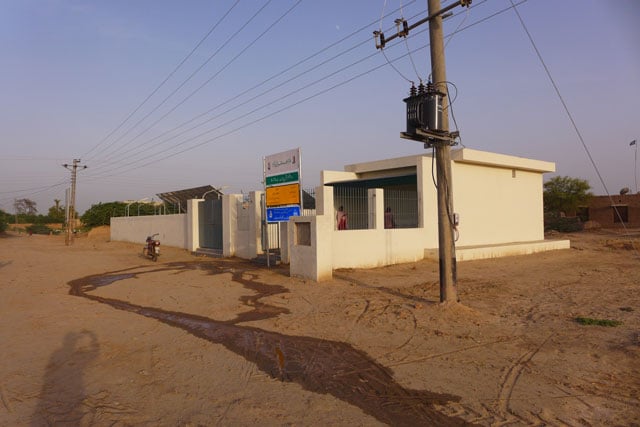
Today, it is on a life support system and emergency moves to help it stay on its feet may be too little and too late. First the good news, such as it is. Potable drinking water supplies have always been a problem and there have been various solutions, including an Asian Development Bank project in the late 1990’s to provide safe drinking water. It failed. People were unwilling or unable to pay the Rs50 a month subscription and the pump now lies derelict.
But three months ago a government funded solar-powered pumping and filtration plant was inaugurated — and it has changed lives immediately. The village church made an application for the project and offered land. The government picked up and in five months the deal was done and the work commenced. And there it stood… shiny clean and busy from dawn to dusk. Built in the Christian sector of the village it is used by Christians and Muslims alike. No tension. The son of the Muslim numbardar got the job of caretaker. Rumours of Shabaz Sharif coming to open it proved unfounded (villagers cleared a helicopter landing place just in case) and the project, as well as identical projects in other villages in the area, came on stream to no fanfare and got no press or other media coverage despite being an obvious good-news story. A win-win all around.
Conversation with my sister-in-law, a lady health worker in the village for almost 30 years, revealed that there had been a dramatic drop in the numbers of people suffering illness caused by polluted water. The communal tankie is little more than a pond of toxic sludge, and source of many of the infant ailments and deaths. Effective as the new water source is it may not be in time to save the village.
Comparing pictures I took a year ago with those I took last weekend it is visibly crumbling away. There are no new houses built in a decade, and those that are there are in poor repair. There are no jobs as farms have been subdivided to the point at which they can no longer sustain a family. None of my extended family, all farmers, is now exclusively in agriculture. Some have sold their land and moved to the cities mostly doing menial jobs, their skill-sets not matching an urban labour market. Such work as there is is limited to daily wages in the fields when sugar and cotton are harvested. And that is not enough to keep the wolf from the door, as I discovered when I visited the compound of the woman who was ayah to our youngest child for the first year of her life.
Going through the broken gate it was like entering a photograph of the liberation of one of the Nazi death-camps at the end of World War II. I do not exaggerate. ‘S’ herself was emaciated. A friendly hug gave me an armful of bones. Her eyes were black and sunk back in her head. She moved as if sleepwalking. She had not worked for months, and neither had the extended family. The men lay on charpoys drunk or stoned on local hashish. Children were stick-thin and obviously stunted. A visit to another family of my acquaintance repeated the experience. These people were, quite literally, dying on their feet and a solar powered water project is not going to save them. There is a silent catastrophe in train across much of south Punjab. Entire communities are in the graveyard expansion business. Who knew? Who knew?
Published in The Express Tribune, August 18th, 2016.
Like Opinion & Editorial on Facebook, follow @ETOpEd on Twitter to receive all updates on all our daily pieces.

1726222798-0/Tribune-Pic-(13)1726222798-0-165x106.webp)
1726014113-0/Untitled-design-(15)1726014113-0-165x106.webp)










COMMENTS (2)
Comments are moderated and generally will be posted if they are on-topic and not abusive.
For more information, please see our Comments FAQ